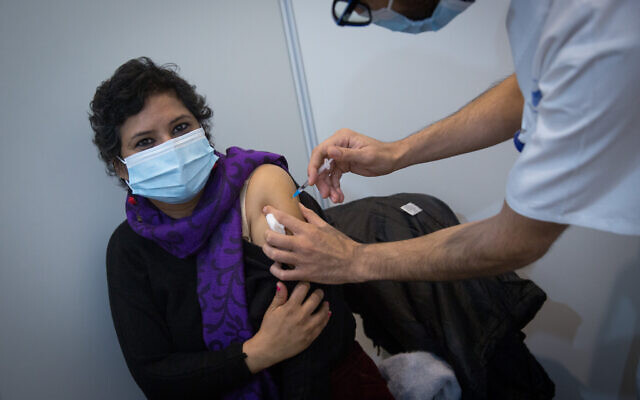Israel’s Vaccination Rates Soar
Israeli Cabinet bans foreign flights until Jan. 31 to keep out virus variants.

“It was the best of times, it was the worst of times.
-Charles Dickens
The quote aptly describes the current status of Israel. Unquestionably, Israel leads the world in getting its population vaccinated, according to Oxford-based Our World in Data. Nearly a third of Israelis have received the first dose of the COVID-19 vaccine; three-quarters of the most vulnerable over-60 population have received at least one dose. The number of new cases of the virus is dropping.
One of Israel’s four national healthcare service providers, Maccabi, reported a 60 percent drop in COVID-19 infections three weeks after the first vaccine was administered.
That’s the good news.

With particular concern with the U.K. variant of the virus, which is considered more contagious than the original, the Israeli cabinet voted Sunday to ban foreign airlines from landing in Israel at midnight Monday night, or 5 p.m. Atlanta time. The new restriction will end Jan. 31, when the country’s third lockdown is scheduled to come to an end. During the flight ban, exiting the country will also be limited.
According to Israeli newspaper Haaretz, exemptions will be made for foreign cargo planes, firefighting planes, medical emergency flights and for those in need of overseas medical treatment. However, for the first time ever, Transportation Minister Miri Regev said Jews can’t make aliyah during the ban.
There is more bad news. Police are being forced to protect themselves from aggressive crowds of ultra-Orthodox who refuse to adhere to the COVID restrictions, despite the fact that the highest incidence of the virus is within that community. Nearly 40 percent of Israelis testing positive for the U.K. variant are ultra-Orthodox, despite accounting for only 12 percent of the population, according to Israeli press reports. Still, Hasidic rabbis are insisting that their schools remain open notwithstanding the national closing of educational institutions.
Israel’s National Insurance Institute, meanwhile, reported that the pandemic created a 20-year low last year in the country’s standard of living. Although financial support from the government and extended unemployment benefits prevented a double-digit increase in poverty rates, that means more Israelis are dependent on government handouts. The overall economy is not predicted to rebound for years.
That’s partly because Israel’s middle class shrunk by about 15 percent last year, according to a report issued by Latet, an organization that works to fight poverty. The poverty rate among self-employed rose to 16.5 percent from 15.3 percent in 2019, according to the NII report.
Even while Israel’s government approves new anti-COVID measures, vaccinations continue. Those 40 and over can now get vaccinated, as well as teens born in 2003 and 2004, or 11th and 12th graders, so they can complete their matriculation, or pre-college testing.

Israel’s successful vaccination program entails providing Pfizer, one of the leading vaccine manufacturers, with statistics about its effectiveness. “We are giving them statistics about number of cases, gravity, vaccination data, side effects and antibody levels,” according to one Jerusalem physician who is involved in the vaccination program and declined to be identified. “What we are providing to Pfizer is supposed to be only statistics. What they get in fact, is anybody’s guess. The Ministry of Health swore loud and clear on TV that they were giving no personal data and sending no personal files. What they actually do is anybody’s guess.”
Known for their cynicism, Israeli citizens are spreading humorous videos around the world via social media about what personal information the government might be sharing with Pfizer, and the potential repercussions of that sharing.
Less humorous is the speculation by the Deputy Health Minister Yoav Kish that the scheduled general election on March 23 – the country’s fourth in less than two years – might be postponed if the COVID virus is still spreading in the country. In Israel, essentially all voting must be accomplished in person.



comments